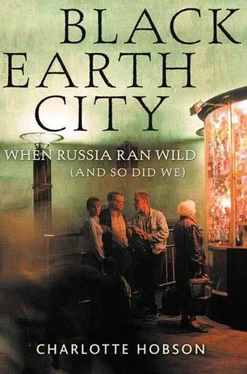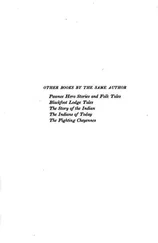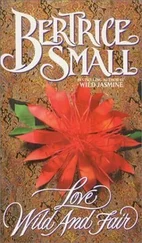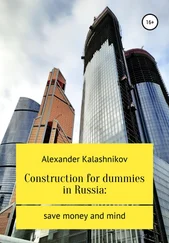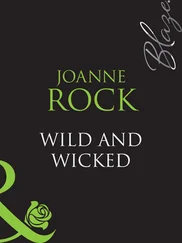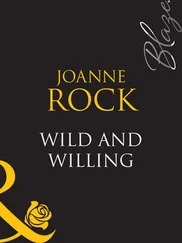Oct. 5
Spent last money on vodka for anesthetic for Tanya.
Oct. 15
Collected student grant—92 rubles. Enough for 18 packets of cigarettes. How will we survive the month?
Oct. 20
Only half a sausage left. Don’t know whether we can afford to keep on feeding the invalid.
Despite the prospect of starvation, the atmosphere was cheerful. The hostel air was having its effect. Yakov and Nina were together; Ira, up in our room, had fallen for Joe after feeding cheese toast to him at our first party, and for the rest of the year they sank into a soporific passion fueled by cannabis. Tanya was stepping out with an English boy, as far as her plastered leg permitted. And Emily, my main ally, had finally been won over by Yuri, a sophisticated, funny boy who had swept aside her other admirers.
I found myself alone in Room 179 one evening, close to midnight. I could no longer concentrate on my book. The bulb overhead gave off a grayish, shadowless light, barely illuminating the piles of clutter; the laundry on the line, the layer of dust. The refrigerator shuddered violently and fell silent, as though forever. The room was very quiet. Only a little creaking noise could be heard occasionally as the wallpaper peeled away from the walls. I listened hard. Surely I was not the only person who heard this tiny, insistent beat, the pulse of hostel couplings. Creak-creak. Creak-creak. It began slowly, then picked up speed. Creak-creak. Creak-creak. The walls were pulsing too; the whole building was joyfully, mindlessly joining in the rhythm.
I pulled the blanket over my head and tried to sleep.
I should like to call you all by name,
But they have lost the lists.
ANNA AKHMATOVA, “REQUIEM,” 1935–40
The forest outside Voronezh covers many miles and it is easy to lose your way among its closely planted stands of pine and birch. Russian families eager for mushrooms and berries flock to it in daytime, but when the light begins to fade and the birds fall silent they make sure to catch the elektrichka , the little electric train back to town. Once they are at home tasting the mushrooms fried in garlic, however, the conversation returns to nature and its healing properties. To our woods, someone announces, raising a glass of vodka. How good they are for the soul!
Igor Kazakov was a big, lazy, graceful man with a sense of irony. The first time I met him, he lay stretched out on a bed in the hostel, smoking cigarette after cigarette, saying little. It was late and there were empty bottles under the table by the time he mentioned the woods.
“I know a beautiful place in the forest, a camp, all on its own. A few wooden huts, and a river which we jump into after the steam bath…” he began. “My father and his friends built the camp in the sixties, when they were at university and it was all free love and the songs of Bulat Okudzhava.” Igor smiled. “He’s a cynic now, of course.”
Igor drew hard on a cigarette. Then he continued, “You know how Russians are. The idea of living in the countryside is horrible, yet we have a passionate romance with nature… It’s a nine-kilometer walk to this camp, and by the time you arrive, it’s as though the city never existed. Everyone behaves differently there, they’re happy…” He looked embarrassed and laughed. “You should see it for yourselves.”
So on the following Saturday five of us met Igor at the station. He was carrying his guitar and a five-liter jar of marinated pork for shashlik. With him stood a boy and a dark-eyed, intense girl whom he introduced as Seryozha and Lyuba.
“When Igor called, I said we wouldn’t miss it for anything,” Lyuba told us as we headed for the train. “We need to relax.”
“You’ll see,” said Igor dryly, “that when Lyuba relaxes, she does it all the way.”
We peered out of the train windows at the city’s Saturday afternoon bustle. The industrial zone on the left bank of the reservoir puffed pinkish smoke into the sky. A fishing boat chugged past the bridge, while the fisherman hurriedly prepared his bait. From the steep right-hand bank, with its jumble of wooden houses, came the busy tock-tock of homeowners engaged in renovations and on Revolution Prospect even the chess players, baking gently in the sun, looked more animated than usual. This was what Russians call the “woman’s summer,” the last warm days of the year before its youth is cut short by autumn. Our little elektrichka, clattering along the tracks to the woods, only added to the air of hard-won holiday.
After half an hour’s journey, we climbed down onto a strip of crumbling concrete and looked about us. The midafternoon sun made everything glow. Igor played the opening riff of one of those Russian songs that sound like a march and originate in the prisons. “Let’s go,” he called over his shoulder. “Nine kilometers to the camp.”
It is hard, now, to catch the sensation of that night without later memories intervening. Birches lined the road, their leaves already orange against a soaring pale blue sky. Behind them stood the dark, serried pines, growing so dense as to be almost impenetrable. At intervals, paths branched off at right angles to the road; lined with identical trees, they ran far into the distance. After three or four kilometers we came to a sign by the road. The silhouette of a man’s chest riddled with bullet holes stood out against a white background. There was one word beneath: MEMORIAL.
“What is it?” I asked.
“A sign,” said Igor.
“Igor, but what does it mean?”
“Oh, Russian politics. Lyuba knows all about it.”
Lyuba was silent for a moment. Then she said, “It’s a monument put up by the Voronezh Memorial group. My father’s the president. If you’re interested, I can tell you about it—”
“I’d like that-”
“But not now. I’m sorry.” She turned away. “I hear about nothing else at home. Now let’s have a drink, Seryozha, shall we? We’ve come to enjoy ourselves.”
The woods have many powers. Their sheer extent—stretching a quarter of the way around the world, north and east of Voronezh all the way to Vladivostok—draws you in like vertigo. One billion pine trees, each the same as its neighbor. How many people have vanished into their enormity? How many woodsmen live on undisturbed, unaware, perhaps, of the fall of Communism or even of the Revolution? There were Polish partisans from the last war who did not emerge until the fifties. The Greens, Russian peasants who abandoned or were driven out of their villages in the civil war, were not quelled for a decade: they would burst out of the forest, slaughter villages or Red Army columns, and disappear.
Every Russian child knows that the woods are full of terrors. Bears, wolves, boars roam in them; mischievous and evil spirits of all kinds entice you, mislead you, and drive you mad. I remember my mother telling me about Baba Yaga, the witch, who lives in the woods. By day she sleeps in a house that stands on chicken legs, surrounded by skulls with glowing eyes. By night she flies through the trees in a pestle and mortar, searching for victims. Even in the gentle English downlands, the idea was enough to keep me awake and rigid in my bed.
“Listen,” said Igor, stopping suddenly. “Can you hear?”
In the silence I heard a thousand whispering voices.
“The woods are telling us something…”
“Oh, shut up, Igor!”
Igor laughed, took up his guitar again and began to sing:
“Akh, that evening, that evening,
When the evil wind blew…”
The light was fading by the time we arrived at the camp and a huge yellow moon had risen. Seven or eight huts were clustered by a river where it widened to a form a deep pool. Mist was rising from the water in coils; behind it we could just make out the ghosts of trees on the opposite bank. We were excited and ran about, building a fire for shashlik and to heat the steam bath. Seryozha and Lyuba had finished off the wine on the way. Seryozha sagged palely against a tree and fell asleep, while Lyuba was roaring drunk.
Читать дальше
